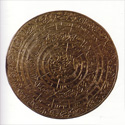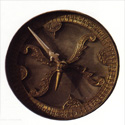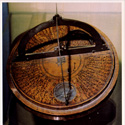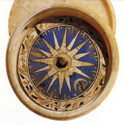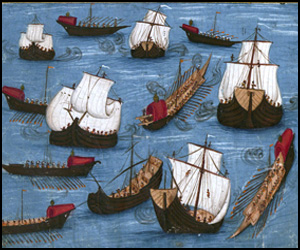Nautical Sciences

Seafaring and Nautical Science:
It
is worth beginning with some common flaws related to the history
of seafaring and nautical sciences. The first flaw is the common
misconception that the Muslim contribution to the subject in any
form or manner is negligible because simply the Muslims feared
the sea. The second relates to the common practice consisting in
attributing accomplishments in the field to entities other than
Muslims; mainstream history suppressing the Muslim role, and
then giving many explanations for such breakthroughs,
explanations which are not just different from each other but
also very often fundamentally contradict each other.
The
first of these two flaws can be looked at briefly; the second
will get lengthier treatment under two separate headings.
With
regard to the first generalised misconception, we are told that
the Muslims did not contribute to maritime discoveries for the
simple reason that the Muslims feared the sea. Thus, Udovitch,
an otherwise much appreciated scholar by this author, says:
‘For
the pre-Ottoman Muslim policies around the
Hillenbrand devotes a good amount of space to stress this point
of Muslim antipathy for, and fear of, the sea.[2]
One instance she gives to support this view is a mid 13th
century (during the crusades) alleged conversation, reported by
the contemporary historian, Ibn Wasil, between the captured
French king, St Louis (Louis IX), and the Muslim Emir Husam
Eddin, who had been deputed to guard him. Husam Eddin said to
his royal prisoner:[3]
‘How
could it have come into the mind of a man as perspicacious and
judicious as the king to entrust himself thus to the sea on
fragile piece of wood, to launch (himself) into a Muslim country
defended by numerous armies and to expose himself and his troops
to an almost certain death? At these words the king smiled and
said nothing. So the emir went on as follows:
'One
of our religious scholars thinks that anyone who exposes himself
and his belongings twice to the sea must be considered as mad
and that his testimony can no longer be accepted in law.’
Thereupon the king smiled again and said: 'He who said that was
right'.[4]
This
story is for Hillenbrand evidence confirming the Muslim fear of
the sea. This, in truth, is evidence of wanting scholarship, for
a reported conversation is by no means
evidence. Facts prove truth, not conversations, and facts
show that the Muslims sailed to China
as early as the 8th
century, and that to conquer Spain from 712 onwards, the Muslims
had to cross the sea, and they did so to conquer all islands of
the Mediterranean
(Corsica, Crete, Sicily
,
Majorca…), and countless more instances of the sort. Michael the
Syrian, a Syriac chronicler, speaks of 5000 Muslim vessels,
including supply vessels, attacking
Even
more baffling, is when one finds Western scholarship attacking
the Muslims for their fear of the sea, and the same scholarship
attacking them for quite the reverse, for dominating the sea and
ruining sea-trade. Pirenne and his followers, for instance,
blame the decline of Europe on the fact that the
‘In
order to bring this piratical pestilence under control, the
Spaniards had attacked North Africa
a number of times and
had occupied the small mountainous islands lying opposite
Down
to the beginning of the 19th century the Beys of
Tunisia
and the Deys of Algiers
, as
well as the Qaramanlis in Tripolitania and the rulers of Morocco
,
had diligently pursued a career of piracy, which being directed
against the Christians, was regarded by the Muslims as a
meritorious war of faith.’[12]
The
mere mention of
Which causes one to ponder: how come a people so afraid of the
sea, so inept at anything to do with the sea, could cause such
terror on the sea for twelve centuries. One of these views, at
least, does not hold truth; most certainly neither does.
This
matter having been addressed, it is now worth looking in greater
detail at the second generalised weakness of mainstream history,
which offers us a crowd of explanations for the modern maritime
discoveries, explanations, which are deficient to their very
core, and which are also contradictory with each other.
[1]
A.L. Udovitch: An Eleventh century Islamic Treatise on
the Law of the Sea; in Annales Islamologiques;
XXVII (1993), pp. 37-54; at p, 38.
[2]
C. Hillenbrand: The Crusades, Islamic Perspectives
(Edinburgh University Press; 1999), pp. 556 ff.
[3]
Michaud, Histoire des Croisades, IV, 449; in C.
Hillenbrand: Crusades; p. 559.
[4]
C. Cahen: '
[5]
Edited and Translated by J.B. Chabot; II; p. 484; in M.
Lombard: Les Textiles; op cit; p. 202.
[6]
M. Lombard: Les Textiles; op cit; p. 202.
[7]
Ibid.
[8]
Ibid.
[9]
H. Pirenne: Mohammed and Charlemagne; op cit.
[10]
See, for instance, B.M. Kreutz: Before the Normans;
op cit; for repeated instances of early Muslim sea-borne
attacks on the Mediterranean
realm.
[11]
A. Cortesao: Nautical Science and the Renaissance; in
ARCHEION; vol 2; pp. 1075-92; p. 1080.
[12]
C. Brockelmann: History of the Islamic Peoples
(Routledge and Kegan Paul; London; 1950), p. 292; p.
397.
[13]
P. Earle: Corsairs of
[14]
BBC 2: Time Watch; 10 January 2003, seen by this author.
|

